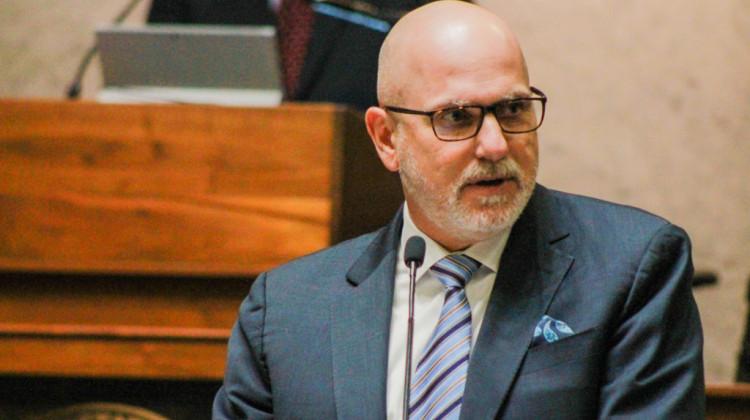
Indiana University School of Medicine Neurology Center.
Indiana University School of Medicine/YoutubeThe Indiana University School of Medicine received a grant of up to $12.3 million aimed at developing a new drug that could potentially help treat opioid withdrawal syndrome. The funding will kick off a five-year project, from research and initial trials on patients to production of the drug.
Dr. Andrew Chambers is an addiction psychiatrist and neuroscientist at IU School of Medicine’s Department of Psychiatry and one of the project leads, alongside Christopher Toombs, co-founder of the Seattle-based drug company Proniras.
Chambers said developing tezampanel as a drug aimed at helping treat opioid withdrawal syndrome can help develop it into a drug that could also help treat other disorders. He says there’s an easy way to think of how tezampanel works in that role.
“If you think of opiate withdrawal as being a highway where too many of the drivers are speeding and are getting involved in wrecks,” he said, “When we put the drug tezampanel on there, we’re gonna kind of disrupt that hyperactivity of neurotransmission on this super highway, we’re going to calm it down.”
Chambers said because opioid withdrawal symptoms are so severe, sometimes those suffering from addiction won’t seek treatment to avoid those symptoms. He says some people go as far as describing withdrawal as torture, both mental and emotional.
Chambers said a drug like tezampanel, which could help manage those symptoms, could prove beneficial in helping people get the help they need.
“Given the huge epidemic of addiction and the carnage going on with it, the need is just huge in going forward,” Chambers said.
The current research on the drug, which has yet to be tested on patients, shows promise it could be helpful in treating those withdrawal symptoms according to Chambers. He said the research is based on basic neuroscience.
The first $2 million stage of the project, awarded by the National Institute of Drug Abuse (NIDA), will be conducted over the next two years and focus on preclinical work and the drug’s role in models of opioid withdrawal and in combination with opioid and benzodiazepine drugs, which are commonly associated with opioid addictions and lethal overdoses. If the drug is regarded as safe and promising, NIDA and the Food and Drug Administration (FDA) will approve continued work on the project and offer the rest of the $10 million of the grant.
In the last three years of the project, IU’s School of Medicine will conduct clinical trials, and administer tezampanel to patients suffering from opioid addiction, and eventually pursue further testing nationwide.
Contact reporter Bárbara at banguiano@lakeshorepublicmedia or follow her on Twitter at @radiospice219.
 DONATE
DONATE







 Support WFYI. We can't do it without you.
Support WFYI. We can't do it without you.